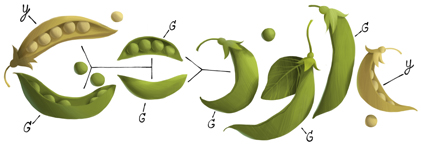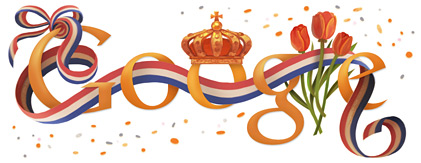Google’s Doodles: How transforming logo can empower a brand
I’m always get excited whenever I enter Google’s page and there’s an intervention in the logo – more or less expressive – featuring a holiday, birthday or something totally new to me with drawings, videos, games or interactive animations. Who never heard or read about a doodle and ran to Google’s website to check it out? All these customizations seem only a funny thing – even the name refers to it- but they are helping to empower the brand and the concept of the company.

First, let me explain a little about the history of Google’s doodles. Back in 1998, Google did the first playful logo, Burning Man, to explain the office absence during the event. In these 13 years, Google now features more than 1000 global and local with themes that varies from Mother’s day to the 183th Birthday of Jules Verne passing to the Groundhog day.
According to Doodle4Google, the interventions are supposed to “made searching on Google more fun and enjoyable for its users worldwide” but, actually, they are doing a lot more than that. Doodles are a way to reinforce the brand. Users of search engine sites don’t need to pay attention in the front page because what they are looking for only appears after the search, so, if the front page is always the same, people get used to it and the brand goes unnoticed. With the non-static logo/homepage; the site generates more interest in users often creating discussions in blogs, sites and social media.
Another reinforcement of the brand showed in these doodles in the reference of Google’s logo. Sometimes they maintain only the colors and others just make whatever the draw is to spell GOOGLE. This is a way to keep visual identity together and to surprise the users making them “look” for the word in the doodle. Along with this there is the predictable factor. Holidays doodles are expected and even collected by many Google’s fans.

The repercussions of a doodle can be pretty big. People played so much with Les Paul guitar that Google made a special site for it. The first doodle game which was made for Pac-man’s 30th birthday costs $120 million in lost productivity only in the 48 hours that the game was online. The celebration of Isaac Newton’s 366th birthday and John Lennon’s 70th birthday – first animated doodle and video respectively – also cause some buzz in Internet world. The decision of what event they will celebrate can make repercussion as well. When Google decided not to make a doodle for the Gay pride month, the critics were hard.
All those backlash leads to the main importance of doodles: fidelity. A logo that shows frequently mutation and can be watched, played or interacted, draws attention to the site and makes people more comfortable and interest with the brand. This interest – along with consumer satisfaction – results in a relationship that can extend to other services of the company. They trust that whatever comes of this company has a good chance to be good. One evidence of that is the Google’s recent patent on doodles, the name is very suggestive: “Systems and methods for enticing users to access a web site”. This patent demonstrates the very importance of doodles in Google.
But these cute logo can also be a two-way street. Discussions in blogs show that whenever Google posts a new doodle, Internet traffic from others sites go down. Users enter in the search site with something in mind and get distracted with a new logo – specially the interactive ones – and forget about the actual research. That means a lot coming from the owner of 6% of all Internet traffic. Bad for the sites, good for Google’s concept.
Beneath, is the latest doodle video, celebrating Freddie Mercury’s 65th Birthday. Enjoy!